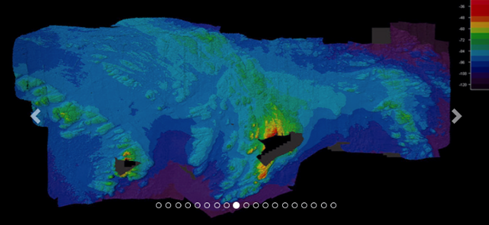BlueTech - Innovative Technologies Applied to the Blue Economy
January 24, 2023

This innovative interactive e-book aims to provide a quick introduction to how Technology and Innovation are being applied in the Blue Economy. An interactive e-book is more than a pdf or static electronic document. This e-book includes text and a wide range of interactive elements (e.g., hyperlinks, photo galleries, video galleries, interactive graphs, interactive maps, interactive data/knowledge filters, etc.) drawing upon multiple online resources.
The e-book contains text and interactive graphics that enhances the user’s knowledge and learning experience. Check out the interactive elements:
-
Multi-Media: Picture and video galleries, presentation slides
-
Interactive maps: To move around the map click anywhere and drag around. To zoom in or out of the map: Press Ctrl + or Ctrl -. Click anywhere to get details about a place.
-
Interactive graphics: When the reader place the mouse on top of some graphs, more information pops-up.
-
Interactive data and knowledge portals: These Annexes allow the reader to have access to further knowledge resources and information.
About “Blue tech”
The Blue Economy is an emerging focus area for sustainable development in many countries (many have more marine area than terrestrial area under their jurisdiction). There are a range of development opportunities in sustainable fisheries/ aquaculture, addressing marine pollution, resilient seascape management, and rethinking oceanic sectors that can help them with growth and poverty alleviation goals. These are complemented by sustainability and governance challenges including marine pollution (including plastics/microplastics), climate risks exacerbated by climate change (sea level rise, coastal storms and flooding), coastal erosion, and inadequate information, institutional, and infrastructure capacity and frameworks to manage these issues effectively.
Emerging technologies have the capacity to “disrupt” the blue economy by helping countries leapfrog and scale impact when adopted effectively. These include “disruptive technologies” that are already helping rethink informatics for decision support, operational systems, and stakeholder interaction.
“BlueTech” refers to the innovative use of these emerging technologies to scale up the positive impact and manage risks associated with the Blue Economy. These can range from the use of earth observation and sensors to improve sustainable fisheries, drones to help plant mangroves, forecasting and early warning systems for coastal storms, robots to clean beaches and floating trash, to floating energy production, autonomous ships and even undersea agriculture! Some of these could be doing things differently (faster, cheaper, more sustainably) and others give us the ability to do different things (that seemed unimaginable just a few years ago). This exciting new array of options – ranging from systems already established in-use to being a twinkle in the eyes of startups have the potential to help us rethink the Blue Economy – not only in the developed world, but to provide a new paradigm of development in many parts of the developing world.
There is a strong need especially in the developing world to learn from emerging global good practices and risk management measures in a rapidly changing technological environment. The World Bank’s Open Learning Campus (OLC), the Digital Development Global Practice (with its Digital Development Partnership), and the Environment, Natural Resources & Blue Economy Global Practice are helping document and showcase evolving global innovations of interest to this new BlueTech world as part of this free virtual knowledge exchange.
Link to eBook


